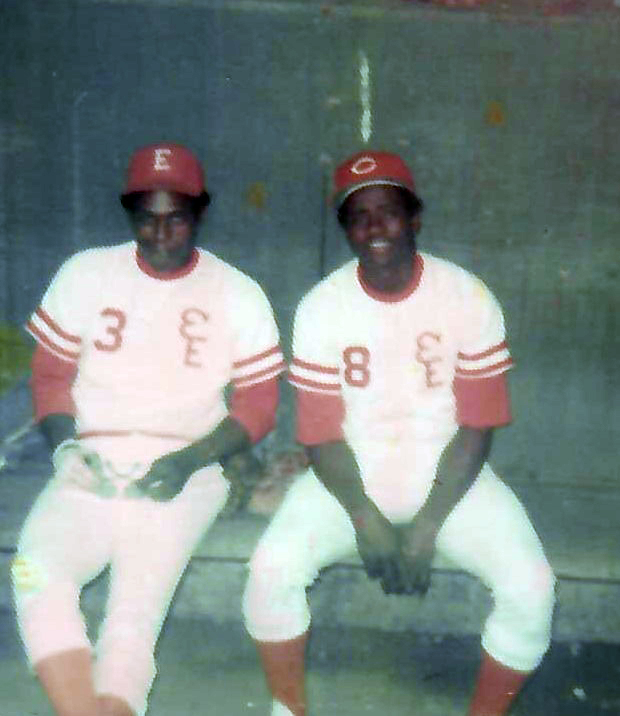
Infielder-outfielder Tom Watkins was signed by the Reds in 1974 following a tryout. He hit .331 for the 1975 Eugene Emeralds, with 11 home runs and 61 RBI. Injuries to both knees ended his career three years later. I interviewed Tom and his wife, Kathy, at the 2019 Ems reunion in Las Vegas.
Jim Haught Tell me the back story of how you got signed, and all that.
Tom Watkins At an early age, they used to have baseball. The older guys, they used to play on Saturdays and Sundays. It was a Black league, and they used to travel all over Florida, playing on the weekends. My mom would let me go out and watch them on the weekends, and I fell in love with the game. I said, man, this is what I want to do when I —
JH So you were a baseball guy from the time you were little?
TW Yeah, just watching it.
JH Was that your main sport?
TW I played football and basketball too. I played all three sports, and finally I loved the game from watching, and I said, that’s what I want to do when I grow up.
My Mom always told me that we were related to Jackie Robinson. My grandfather’s from Cairo, Georgia. That’s where Jackie Robinson is from. I’ve never been able to tell.
JH Nobody has a genealogy on it?
TW Right. But she told me that our relative left Jackie — left his mom — he deserted them. But that’s all I know. The family, now we’re trying to get the DNA to try to see if we can find out.
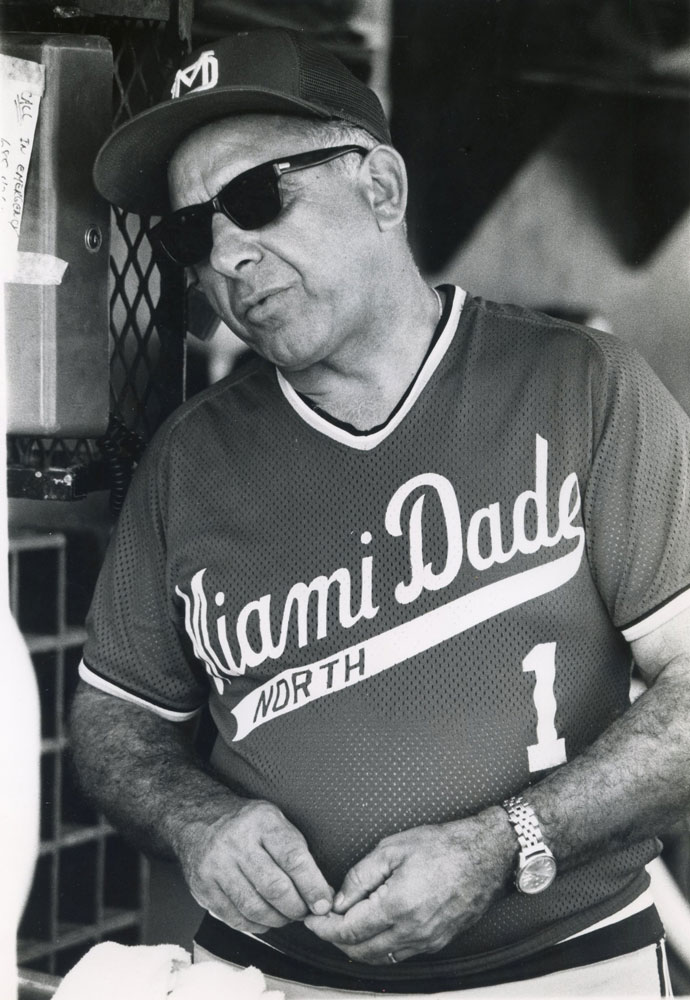
JH That would settle it, for sure.
TW I played Babe Ruth one year in Fort Myers. Then I played high school, and then I went to college: Dade North. Miami Dade North. Demie “Doc” Mainieri, you ever heard of him? I played for him.
As an undrafted player, Tom had a hard road in front of him if he wanted to play pro ball. But he was undeterred.
TW After I left college, I didn’t get drafted or anything. I started going to tryout camps all over Florida. I had to sleep in my car. On a weekend, I would go. And if they invite you back, you had to stay, and I didn’t have anywhere to stay. I used to stay in my car.
So I went to this one tryout camp in Sarasota, Florida. And I thought I did well. I did really, really good. Came back the next day, and they called [the names of] the people that they wanted to see. And, you know, I was disappointed and I said, wow, I can’t do better than what I did today. So I went home and I told my Mom: I’m not going to any more. That’s it. Get a job and go from there.
But there was a guy, when I left the ballfield that day, he asked me my name and where I was from. That’s all he asked me. Well, the next week, on my job — I worked for the Fort Myers recreation department, and my boss was Joe Coleman, a pitcher for the Cardinals and the Tigers — the guy was a bird-dog for [Reds scout] George Zuraw. And George knew Joe Coleman, so he got hold of Joe. Lo and behold, I worked for Joe. And I just so happened to carry all my stuff in my car all the time, and my bags.
George tried me out right there, and he said, I like what I see. I want to invite you up to Tampa.
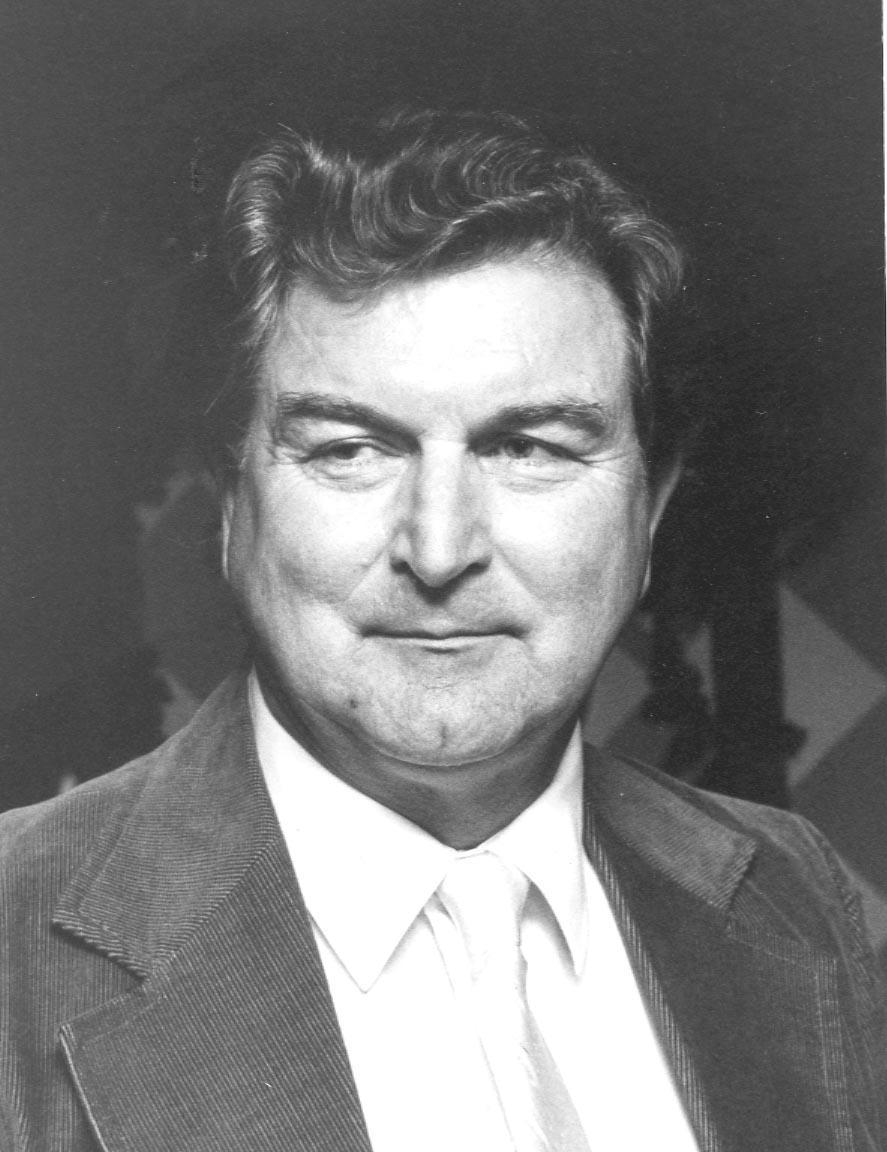
You know, that’s when they were the Tampa Tarpons. But I was tired [of trying out]. I said, what are my chances of signing if I go? I wasn’t going to go. He said, you show me in Tampa what you showed me today, and we’ll sign you.
So I went up there, and Russ Nixon and all those guys were there. I tried out, and they signed me. You know how much I got?
JH Well, I’ve heard stories of guys getting a plane ticket and a couple pair of cleats and a jacket.
TW That’s close. I got a plane ticket, I got $100. I got a plane ticket. I bought a glove and a pair of shoes with the $100. That’s all I wanted.
JH That’s not much, though.
All I needed was a chance. And I was gonna make it — Tom Watkins
TW I didn’t care, because the way I felt in my mind, all I needed was a chance. And I was gonna make it. So that’s how I felt. And that’s how it got started.
They sent me to Billings, Montana, in 1974. But there were so many guys there, it was impossible for all of the guys to play. So they sent me to Seattle.
JH You were 19 years old, at Seattle and Billings both, your first year?
TW Right.
JH And it looks like you played all over the place.
TW I did. When I first started, I started as an outfielder.
JH 15 games in Billings and then 25 at Seattle, the same season.
TW Yeah. They sent me to Seattle, and that’s where Greg Riddoch was the manager. And you know, since I came late, I didn’t play much. But I enjoyed it.
JH You hit better there, too [.230 at Seattle vs. .158 at Billings].
TW Yeah, I did. Cause I started playing, and toward the end of the season I think we were going for the playoff. And there was a guy on the team that was really fast. He stole second base. The umpire called him out; he threw his helmet, and they threw him out of the game. So it was just me and another guy on the bench. Greg came over, told him to go out in right field.
Well, this guy was on pills. He had told me that he knew this doctor that was getting him pills and stuff like that. Greg put him in the game. First time the ball was hit to him, he never saw it. He never saw the ball! He was standing there and the ball fell right behind him. I mean, the fans went crazy. They were pissed. We’re working, running, getting a run for the playoffs —
The next day, the same thing happened. Same thing.
Greg came over: Watkins, go to left field. He wasn’t taking that chance anymore! [laughter]
So I went out there, and now you know the ball’s gonna find you!
I think we were up by one, we’re playing the A’s, and their fastest runner was on second base, we were in bottom of the ninth, he’s on second base. Base hit out to left field. Me!
So I get the ball, throw, and threw him out at home. And you know, everything just happened after that.
JH That was your start!
TW That was my start. I started playing, ever since then. Next year, spring training 1975, I had a good spring, went to Eugene —
JH And you hit .331 there. I mean, you had a hell of a year. And your best year by far for home runs.
TW Yeah. 14 or 11?
JH 11 home runs, 14 doubles, 2 triples, and 61 runs driven in, in 76 games. That’s pretty strong!

TW The last week of the season, I was hitting .360. The last week of the season, my average dropped 30 points.
JH You must have gone oh-for-the-week!
TW I did. Greg came to me — and see, I didn’t, you know — I’m young. I wanted to play. That’s all I was thinking about.
JH Because it looks like you played just about every game.
TW I did. Greg said, I’m going to sit you out this week, so you can win the batting title. No. Greg, I want to play. And he said okay, no problem. And he said, that’s your choice, you know.
And I tell my wife all the time: if I had known what I know now, I would have sat out that week.
JH Did it make that much difference to the front office and stuff?
TW Oh yeah! But even that season made a difference with the front office.
JH Well, .331! I mean, that’ll get anybody’s attention.
TW Yeah. So that spring, that following year, I started out on a AA team. I made the AA roster,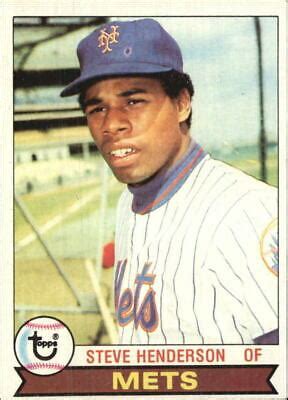 but what happened was — Steve Henderson, you know him?
but what happened was — Steve Henderson, you know him?
JH Oh yeah. Part of the Seaver deal. An outfielder.
As so often happens with young players, a single play changed the course of Tom’s career.
TW Roy Majtyka wasn’t familiar with where the guys played. Steve was a left-fielder; he put Steve in right field.
Popup behind second base. I go to get under it and catch it; Steve runs into me. I tore the MCL in my knee, that spring. And then from that point, it was all downhill.
So I didn’t get to go to Three Rivers with the AA team; I had to stay in Tampa and rehab. And then when I got well, I played with the Tarpons in Tampa.
JH So you got belted on a popup?
TW Yes.
JH You’re playing second base.
TW Right.
JH At that point, were you still playing infield and outfield?
TW No, I was strictly a second-baseman. Second base.
Between Greg and Jim Hoff — great instructors with young guys – they taught me how to play second base. And I loved that.
JH You liked that better than outfield?
TW I did. More action. You’re involved in the game; you can stay in tune with what’s going on.
JH Good hands?
TW Yes. I don’t think I made that many errors. Matter of fact, I made the All-Defensive Team in Eugene.
JH But the knee never really got better?
TW No, it never got better.
JH There were no scopes or anything then. Did they just have to cut on you?
TW No, because of what happened in Tampa, playing in Tampa.
Tony Moretto was the centerfielder, and here we are fighting, bases loaded, trying to win a ballgame. Popup right over the second-base bag, out in left-center. I’m playing second. I look up, and I said, dadgum! I don’t know what Tony was doing — if he wasn’t paying attention. I said, man, we gotta have this ball! So I went and I went for it, running. Tony ran into me. Same thing, the other side.
JH Oh — both knees?
TW Yup. So that was pretty much it. But I stayed around a few more years. They just — because they liked the way I hustled, and I loved the game, and I went to Shelby. And a couple of years, 1977, 1978.
And then, my father got killed in 1977. That was the last straw for me. That was the last blow.
JH You went from .278 to .221. People who judge players sometimes don’t factor in something like that, and what it does to you.
TW Yeah. It affects – because I look up in the stands, my Dad’s there. He wouldn’t even bring my Mom; he would just pick up and say, I’m going to the ballgame, you know, and I can always — that affected me a lot.
But even after that, they tried to keep me. But I just wasn’t mentally ready to just stay there and play, or coach. That’s what they had asked me to do. Hindsight, I wish I had done it.
JH Is that the biggest regret of your career? Would you have been a player-coach?
TW That’s correct. I would’ve started out as a player-coach, and then phase into being a manager and then, the sky’s the limit. And I think I could’ve done it.
JH What did you end up doing?
TW Well, I ended up working for the power company in Florida. I worked for the largest power company in Florida. I’ve been there 39 years. I’m still working. When I quit playing baseball, I started working there, and I’ve been there ever since.
After baseball, Tom met his future wife, Kathy. She is his “rock” and a sweet, kind woman. It was my privilege to talk to Kathy a bit for this book.
JH How long have you guys been together?
Kathy Watkins 30 years.
JH So you didn’t have to deal with all that stuff when he was playing?
KW No. I hated baseball. I was sitting down with my grandmother in the living room. She was watching the baseball game. My grandfather loved the Pirates and I said, why are y’all watching this boring game? I can’t stand it! And lo and behold, look at me now: I am surrounded by baseball. Our boys were brought up in tee-ball, you know? And so I love it. I mean, we have so much fun!
TW Tommy Jr. is the first-base coach for the Twins.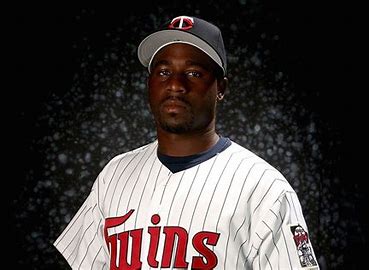
JH How does he like the coaching?
TW He loves it. He’s been in the organization for 22 years.
JH So he earned his stripes — worked his way up. Did he manage in the minors?
TW Yeah. He managed a couple of years; actually, I think, three years. Cedar Rapids. Beloit, Wisconsin. Chattanooga, he managed the AA team.
Everybody came to play and had a good time, and they just carried on through — on the 1975 Eugene Emeralds
JH So everyone is talking about a couple things about 1975: the bond that you guys all have, that’s unusual for a minor-league team; and Greg’s role in getting the team together and keeping them together, and what a teacher he was. Are those things fair? Is that how you saw it?
TW Oh yeah! Well, that’s exactly the way it was. Greg, he was a good teacher and that’s what he stressed: teamwork, fundamentals, and discipline. And when I coached high school, Little League, my boys, I carried all of that with me, and believe it or not, it made a huge difference. But that’s the way, that’s just the way Greg was, and the guys too.
It’s hard to put your finger on it, why a bunch of guys bonded like that. The leadership was the number-one reason. And all the guys, they were just great guys, and we just — I can’t even remember ever having a cross word with anybody, or hearing any of the guys getting into it with each other, or anything like that. It was just: everybody came to play and had a good time, and they just carried on through.
JH That’s something so many Eugene players have stressed when I talked to them: they had a really good time. They had fun playing, but they were still disciplined at the same time.
TW That’s correct.
JH And Greg kind of fostered that idea that, hey, I’m not going to be a drill-sergeant here. Because the Reds had Ron Plaza and some guys like that. It seems like Greg was a polar opposite of that.
TW He was!
He told us, we know all of you guys are from different parts of the country. But the only thing that matters here: once you step between those lines, you’re brothers.
And that’s the way it was. Watkins, I don’t care if you don’t go out with Lucich after the ballgame or whatever. Now, that didn’t happen. You know, we all were tight.
It was awesome. I’ll never forget that.
Unfortunately, the closeness of the players did not necessarily reflect what was going on outside the ballpark for the African American players, who still had to deal with racism.
JH Was there any problem externally, especially given where you were playing? Was it harder for you and George McPherson and Marlon Styles [as African American players]?
TW It was, and a few places — I can remember playing in Boise, Idaho, had people come in and say, we don’t like you N’s here, and pour beer on us in the dugout and all stuff like that.
JH [angry] Oh, no!
TW But the guys, all your guys, they’d take up for you. And you know, they didn’t like it. They didn’t like it, either. But yeah, we ran into that a lot.
But you know what? When you love doing something, it only makes you play better. It made me play better. So I didn’t dwell on that.
Here’s the thing: Those kinds of instances, they either make you or break you. And as a young kid — okay, I can tell you this story:
My Dad took us to Burger King. We had to pick up our food at the back door. I couldn’t wait to get home to ask my Mom why we had to go to the back door to get our food. And she sat me down and she told me — she taught me life. She told me the whole story. And she ended up saying, son, let me tell you this: you put your pants on the same way any other man puts their pants on. So that always stuck with me.
So my mindset was, if somebody told me I couldn’t do something, I was going to do it. I would die trying, you know, before I would give up. Or somebody would say, you’re not this, you’re not that, I was going to do it. So that’s the way I feel about that.
I didn’t dwell on that that much. I just loved the game — to just go out and play. And that’s what I did.
In Eugene, there was a family there, white family there, that adopted me. I will never forget that. For how many years, honey, until they passed away, we got a Christmas card from them every year. For what, 30 years?
KW 30 years. Yeah, a long time. Ever since we were together.
TW We called them Mom and Pops, and they called me their son. Took me all over Oregon. Took me anywhere. We’d go over, it was like I was his son. And another family in Shelby did me the same way. They gave me a vehicle to get around in town; they helped me move in my apartment, and everything.
They were all just fans and they just picked up, you know, certain people that they liked, that they took care of, and it was awesome. So with experiences like that — you can’t dwell on the bad –
JH [flustered] But you shouldn’t have had to go through that —
TW Oh no, you shouldn’t. You shouldn’t.
At this point I was so angry and ashamed, listening to Tom’s stories, I had to stop the interview for a few minutes, because I completely lost my composure. I apologized to Tom and Kathy for those idiots’ behavior all those years ago, and eventually we got back to baseball.
JH Anything in particular you remember about 1975, aside from the winning and that sort of thing? Particular games that stand out, or bus trips, — aside from the negative stuff we talked about?
TW I remember we had two tapes on the bus. The Isley Brothers –
JH From Cincinnati! Chess Records! [laughter]
TW — and the Eagles. And nobody ever complained about the music. That’s all they — that’s what we had, and we played them. I know every song on that —
JH How many times did you hear Shout? About a million? [laughter]
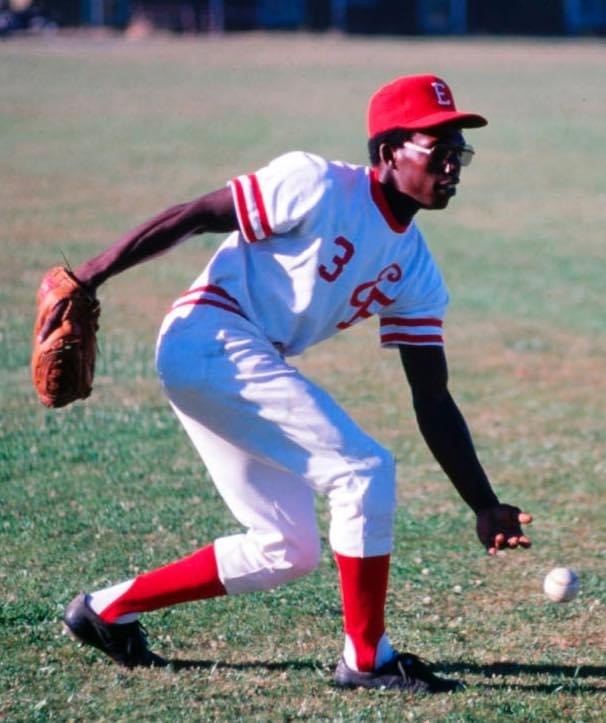
TW You know, the long bus trips. Like from Eugene to Bellingham, Washington: about 14 hours or something like that. And those were rough. But I can remember George [McPherson], I think George and I were small enough to get in the luggage rack, so I always got rest on the trips, because I used to get up there and sleep and rest.
JH So you learned how to sleep on the bus?
TW Yes. Correct. That was my way of doing it. I couldn’t — even if you had a seat next to you that was empty, you couldn’t rest that good. But you know, getting up there in that luggage rack was ideal for me.
JH I think anybody who survives the minors and makes the majors ought to make that good money.
TW You played spring training, sometimes we went to extended spring training. You played the season, and then you play winter ball. You know, that’s a lot of baseball.
We had a guy, George Sucarichi, on that Eugene team in 1975, he got left behind. He missed the bus going to Bellingham: 14-hour trip. And one of the fans brought him to the game. And stuff like that, you know, it’s just awesome. And Greg might’ve fined him for missing the bus. But you know, it was all worth it.
And Marlon Styles, another guy from the 1975 team —
JH He’s in Cincinnati. He does the Urban Academy for baseball.
TW That’s correct. Super guy.
Marlon and I were walking to the ballpark one day in Eugene, and this car was coming, where they were driving real slow. And it was this Black guy in the car. And I said, Marlon, I don’t know what’s with this guy! You better be ready to run. I said, he’s looking at us, and he’s driving real slow. So when he passed by, he looked at us and he continued to go slow.
The car had a Florida tag on it. And in Florida, you could tell the city was that car was from by the numbers on the tag. Well, the tag was from my home town, Fort Myers. I said, Marlon, that car’s from my home town. So I started running, and caught up with the guy.
I knew him because he taught me in high school; he was the bandmaster. And he was at the University of Oregon, getting his Master’s in music. So from that point on, that man went to every ballgame. He listened to every game on the road, and his wife told us he almost failed college because of baseball.
And when he came home from that season, he gave me a box of tapes of all the games that he had. He recorded every game, and he gave me all of that. He gave me all this stuff. He said that was the best year of his life. He’ll never forget that year, 1975.
JH The other guy who took you all over Oregon, was that like a host-family kind of thing?
TW Yes. Ma and Pa McKinney. And George, he just passed away a couple of years ago. His wife passed away about five years ago, and it was awesome when we came out there. We went out during one of the reunions that we had in Eugene. They invited us to dinner. We went there, and it was just awesome.
TW I do remember this time, now. This is the only time I’ve ever seen Greg angry:
Marlon Styles and I, we were in the locker room getting ready for the game or whatever. It might’ve been after a game. Marlon and I were sitting there talking, we were having our fun — you know, baseball stuff. Lynn Jones was right next to me, and this reporter was interviewing Lynn, because I think Lynn hit a couple of home runs that game. And he was interviewing Lynn, and Marlon and I were talking and we had played Portland –
JH The Mavericks!
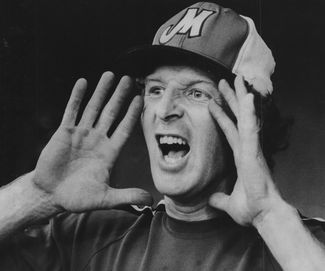
TW Yeah. Marlon, we got to talking about their manager [Frank Peters]: Oh man, I hate that so-and-so, you know, like that. Well this guy, he heard Marlon talking to me, and he printed that in the paper the next day.
Oh, my goodness! When Greg came in in the locker room that next day, he was mad. And he told Marlon, if you ever say anything like that, about somebody else, to a reporter, you won’t be here long. But we explained to him what happened. And he just said that you got to –
JH You gotta read the room.
TW Yeah, yeah. You gotta do that. And you just can’t be, you know, talking. And see, we were young; we didn’t —
JH You didn’t think anything of it.
TW And I can remember the championship games up in Portland. Wow! I’ll never forget this: walking out of the dugout, on the field when they, you’d come – thousands of people in the stands, for this playoff game. And I said, man! It just makes you want to play.
And out in left field – Lynn Jones, I’ll never forget it. Jim Bouton was pitching against us. Lynn Jones hit one. There was a highway out there. Lynn Jones hit one out there on the highway against Bouton. That was awesome.
But you know, I don’t know what happened to — all of my stuff disappeared.
JH Oh, that’s a shame.
TW All of it. I had the programs that — somebody from Cincinnati, they sent me a program that had an article written about me that I had a chance to replace Joe Morgan, you know?
JH Hey, that’s pretty good.
TW That is good. And I wish I had that article.
JH But the tapes are missing, huh? Did they get lost in a move, or something?
TW The tapes are missing. All of my baseball stuff is missing. I don’t know what happened to it.
I can’t even find my championship ring. I had it all together. And at one time they were talking about — what they had, getting a historical museum there in town. And I remember people asking me about it, so I don’t know if my siblings or anything took that stuff. I’ve been to the museum, but I don’t see anything in there that was related to me.
JH What kind of hitter would you say you were? Were you a gap-to-gap kind of guy?
TW Yeah, gap-to-gap. Right-center to left-center.
JH How do you account for the big jump in the home runs the one year? I mean, that’s actually a real peak year for you almost all the way across the board.
TW I can’t answer it. It was just –
JH Was that your last fully healthy year?
TW It was, yeah. That spring training did me in.
JH That’ll put you on the path to replace Morgan! You’re probably a little bigger than him, though.
TW Yeah, he was. He was a cocky son — did you know him?
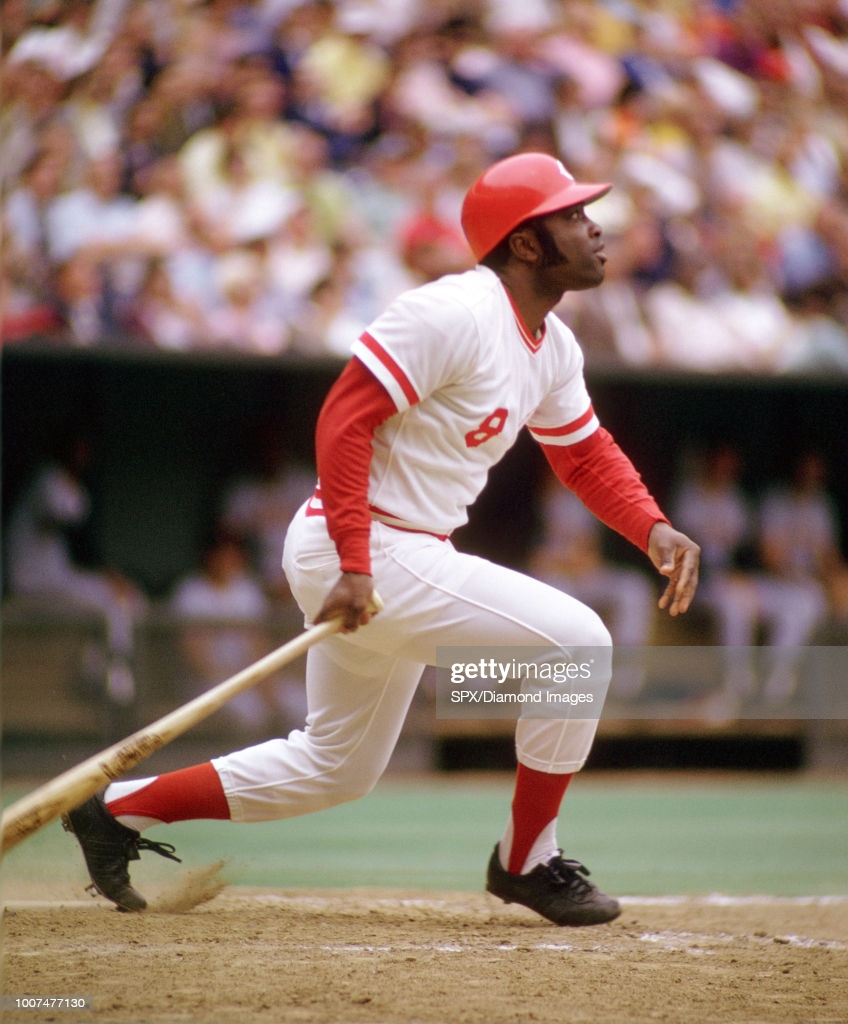
JH I knew of him. And he kind of liked Joe Morgan.
TW He did! No, he didn’t. He LOVED Joe Morgan!
JH Because he would always talk about — he wouldn’t say, I did this. He would say, Joe Morgan did that. I mean, he was a great player for the Reds. And a Hall-of-Famer, no doubt. And this little guy who’s smacking the ball out of the ballpark and winning Gold Gloves, and all that. He had everything but an arm, I guess you could say. It was the only thing he didn’t have. But yeah, Joe liked Joe and, you know, he’s not the first or the last guy who loved himself pretty good.
TW Right. And I used to hear him all the time saying, they bring these rookies up here, and nobody going to take my — but that was him. And I used to play him in ping pong —
JH And apparently he was pretty good at that.
TW He was, and he was the only one in there I couldn’t beat. And that used to make me so mad, because he used to be talking to you: you little rookie, you all come in here, and you know, stuff like that. And I never could beat him, and it always made me mad.
JH Well, I heard that they had pretty intense ping-pong battles in spring training; that he and Rose would get into it because Rose didn’t like getting beat. Morgan had been a city champion in Oakland.
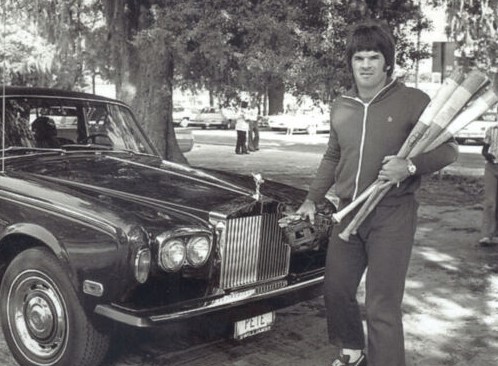
TW It did. And I used to say, Pete, give me the keys to your car, you know, and he’d toss me the keys, and I used to go out there and sit in his Rolls-Royce. AM-FM radio, eight-track, and I said, man, I’m gonna get me one of these when I make it!
But that was my mentality. I was going to be successful at that.
JH It’s a shame you got hurt. I would have liked to have seen you and Joe go at it. I bet you would, too.
TW Yeah. Oh yeah. He was awesome.
JH Being in spring training with those guys, did that rub off on you? Were you able to size up things and say, okay, I gotta raise my game here or there, or this is how you go about it?
TW Yep. It helped me because you see what you need to do, to get to that level. You can’t be a slacker; it’s hard work. You got to work your tail off.
JH When you look back on how you played, and what happened with the injuries and stuff, do you say, well, look, I got as much out of it as I could? You obviously were a hard worker as a player.
TW Yes. I gave it my best shot. I left everything on the field, and I’m not sad; I’m grateful. Things happen for a reason.
You knew you were better than some guys, but it wasn’t my call. And baseball is a game of being in the right place at the right time, so I just figured I wasn’t in the right place at the right time to make it to that next level.
I knew I could play AA, because I played with the guys in spring training on the AA team that 1976 spring training; I could play with them. A lot of the guys that played there, they made it: Steve Henderson, Danny Norman.
JH Did you ever have second thoughts about quitting?
TW I didn’t. Not at that time.
JH You didn’t ever think about going back?
TW No.
JH Did your body heal up enough that you could have played?
TW Not to play, but maybe to coach or something like that.
I actually went in and talked with Chief Bender, to ask him to trade me. And he said no, we’re not gonna do that. You’re the type of ballplayer that we like in the organization.
JH The Reds — were you a speed guy?
TW Yeah, I had some speed.
TW You know, I forgot about something. In 1976, after those two injuries, when I finished that season, I got healthy, and I played winter ball. Stealing second base, I broke my ankle. And people in the stands said they heard my ankle snap.
JH Did you ever feel limited by your size — that people didn’t give you a fair evaluation because you were a short guy?
TW Nope. Because the way I was wired is, you’d have to kill me to tell me I couldn’t do something. That’s the way I was.
I remember when I was a freshman in high school, I could play basketball. I could play all the sports: football, baseball, and basketball. I went out for the basketball team, but that was my first time going out for a competitive sport, and I was so nervous, I couldn’t do anything. I got cut. That was the worst feeling I ever had in my life.
I went home, cried. I cried that whole day. I cried when my mom came home. She said, what’s wrong, son? I said, I got cut from the basketball team. She said, well, all you gotta do is just try a little harder. And it was like a light bulb went off in my head, and I said, I’ll never get cut from anything else in my life. And from that point on, it was Katy, bar the door. And that’s the way — it just changed my life.
I wasn’t going to let size or anything dictate what I could do.
JH Good for you, that you were able to use that in a positive way and that you didn’t — it didn’t hold you back that you weren’t six-foot-two at second base.
TW I left everything on the field. I left nothing to chance. I left everything on the field, and I said, I will never have to second-guess myself. No, that was it. That’s the way I played.
Excerpted from my book The Little Red Wagon: The 1975 Eugene Emeralds.
